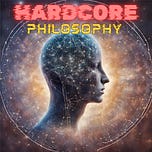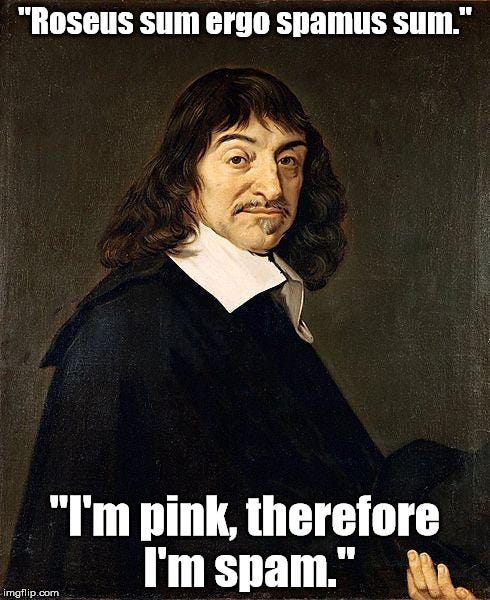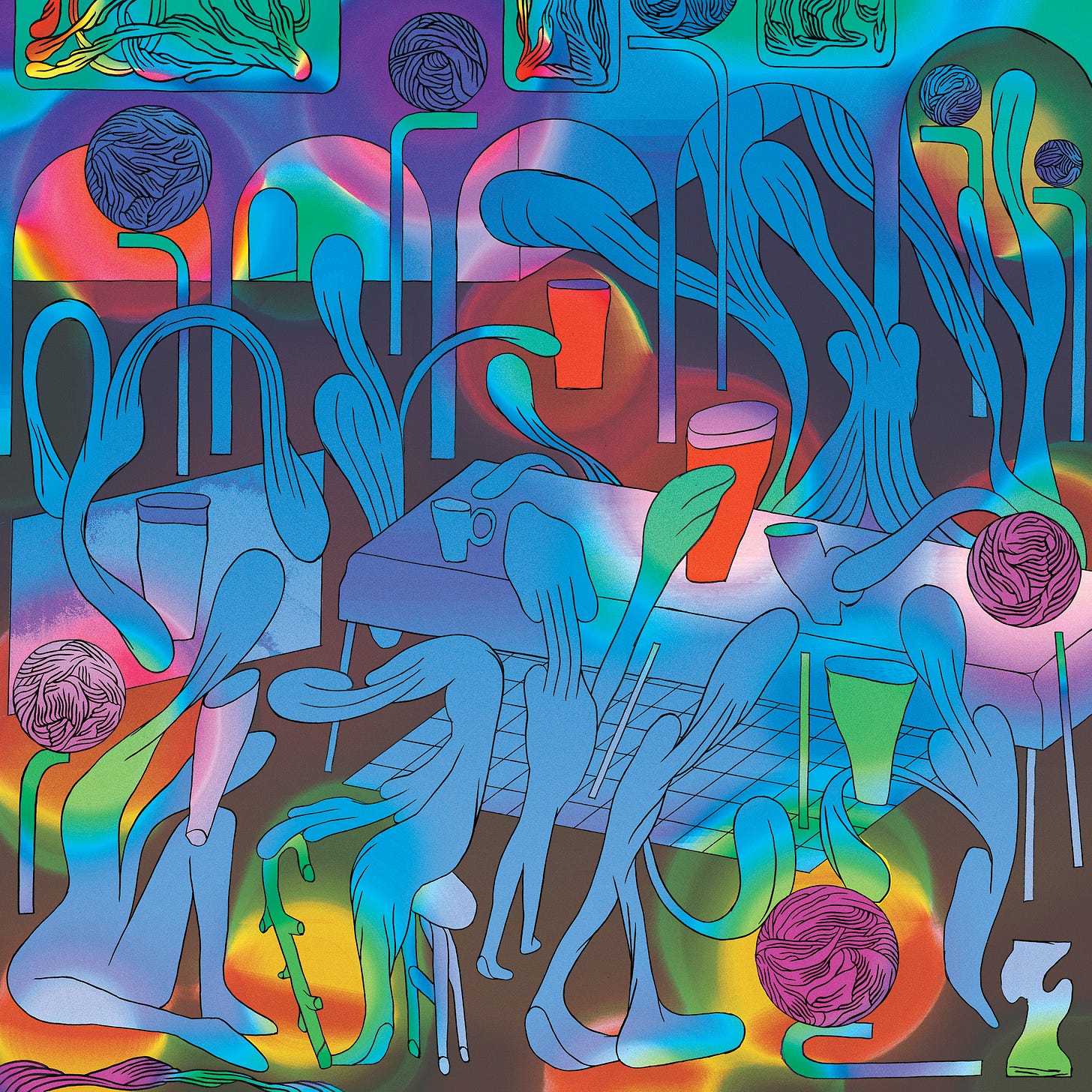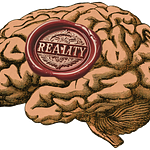The music in this podcast episode comes from the album Subliminal Mind Pub by Nick Herman. Purchase the full album on Bandcamp. Support indie artists!
CONTEMPORARY DISCUSSIONS ON INTROSPECTIVE KNOWLEDGE in philosophy of mind concern whether we can ‘look into’ ourselves and know our own experiences. In these discussions ‘experience’ tends to get reduced to qualia—basic qualitative experiences such as the scent of a rose. One side claims our own qualia experiences are what we can know best, while the other side tries to show we don’t know these as well as we think we do, if at all. So we end up with qualia is knowable on one side and no qualia or self-knowledge at the other extreme.
Full disclosure: I can’t cheer wholeheartedly for either team; I think both sides are too Cartesian, even while they criticize the man himself. But this post isn’t about introspection. It’s a criticism of their criticism, because they don’t always get Descartes right. For instance:
“There’s a long tradition in philosophy, of course, of thinking that we actually know ourselves quite well. Descartes, who has a reasonable claim to be the founder of this tradition, apparently thought that we had infallible and complete knowledge of everything going on in our minds. And he is certainly not the only philosopher to think that. Moreover, commonsense seems to agree with Descartes too. Suppose I want to know what I think or feel or plan to do. I don’t have to consult some fancy expert or do some elaborate experiment. I don't have to consult some third party. I just need to do a little reflection and introspection.” The Limits of Self-Knowledge.
Suffice it to say, if Descartes did claim we have “infallible and complete knowledge of everything going on in our minds,” he then conjured an evil deceiver to derail us every time we add two and two. As usual, the full picture is a lot more complicated.
It’s not just one instance. Here’s another, and another, and another. Even the Routledge Encyclopedia of Philosophy blunders down this path before swerving at the last second with the clever phrase “takes its inspiration”:
“A view which takes its inspiration from Descartes holds that introspection provides us with infallible and complete access to our states of mind.” (Epistemology of Introspection, Routledge Encyclopedia of Philosophy)
But I doubt very many readers would recognize “takes its inspiration” as meaning, “There might be a few lines you can pull from the Meditations to make it look like Descartes centered his philosophy around the idea that introspection is infallible, even though Cartesian introspecting looks a lot more like, Can’t wait to get back to outrospecting!” Not wrong, exactly, but still misleading.
Google’s AI Overview reveals how widespread this mischaracterization is (in its usual insipid way):
This reminds me of an incident in a high school chemistry class when I let someone from another group copy my lab results (I had no qualms about “sharing” my work). I told this person to make some changes, but of course that never happened. The story ends with the entire class mysteriously coming up with the exact same lab results—a scientific miracle! Could something like this be what’s going on out there in internet-land? I don’t know, but it sure seems like it.
On the other hand, seeing the same weird mistake over and over makes me wonder whether I’m the one who’s wrong. I’m not an expert on Descartes, after all. I’m not even a philosophy professor. I admit, I haven’t read everything Descartes wrote, and what I have read, I read a long time ago. It’s possible there’s some passage in The Passions of The Soul that lends support to the ‘self-transparency’ view philosophers attribute to him. Still, it would be nice to hear an explanation as to why something he said in a less popular work should override the general thrust of his more well-known works. A bit of supporting evidence would be nice.
DESCARTES GETS CRAPPED ON by nearly everyone these days, myself included, but he wasn’t the complete doofus philosophers sometimes make him out to be, so we should at least be suspicious of attributions that make him seem thoughtless or stupid. (Unless they’re funny, in which case they must be true.)
Whatever your stance on the subject of knowledge through introspection, we should at least be able to agree on this: Descartes was no qualia freak. Throughout his inward contemplations he took almost no interest in qualitative experience as such; his sights were set on securing a foundation for knowledge—which turned out to be a certain kind of knowledge, or what we now call science. And yet, here’s how Daniel Dennett characterizes Cartesian introspection. But before I go there, let it be known I’m picking this example because it gets at the heart of my complaint, not out of any sort of animosity for Dennett, whose overall views I can’t properly disagree with because I have only barely read them:
“Nothing, it seems, could you know more intimately than your own qualia; let the entire universe be some vast illusion, some mere figment of Descartes' evil demon, and yet what the figment is made of (for you) will be the qualia of your hallucinatory experiences. Descartes claimed to doubt everything that could be doubted, but he never doubted that his conscious experiences had qualia, the properties by which he knew or apprehended them.” (Daniel Dennett “Quining Qualia”)
Of course, the word ‘qualia’ doesn’t come into use until long after Descartes, but more to the point, this passage might leave the unwitting reader with the impression that Descartes filled page after page with baroque arguments about how we can know our qualitative experiences without the slightest bit of trouble—all we have to do is introspect! What’s worse, if you take into account what Dennett himself means by ‘qualia’—as being among other things “intrinsic” or non-relational1—his characterization strikes me as doubly dubious. Now I could take a snippet from Descartes’ second Meditation and arrive at this:
“I can perceive my own mind more easily and clearly than I can anything else.”
Voila. That seems decisive, does it not? Booyah, Tina! But look what happens when we fill that out with its context:
“See! With no effort I have reached the place where I wanted to be! I now know that even bodies are perceived not by the senses or by imagination but by the intellect alone, not through their being touched or seen but through their being understood; and this helps me to understand that I can perceive my own mind more easily and clearly than I can anything else. Since the grip of old opinions is hard to shake off, however, I want to pause and meditate for a while on this new knowledge of mine, fixing it more deeply in my memory.”
Already this should seem quite different from “but he never doubted that his conscious experiences had qualia”. The mind—whatever Descartes means by that word—is what he claims he knows most clearly, but whatever it is that’s indubitable about this supposedly self-transparent mind, it ain’t ‘qualia’ or anything even remotely qualitative. Here’s what he says about qualities:
Strictly speaking, only judgments can be true or false; but we can also speak of an idea as ‘false’ in a certain sense – we call it ‘materially false’ – if it represents a non-thing as a thing. For example, my ideas of heat and cold have so little clarity and distinctness that they don’t enable me to know whether cold is merely the absence of heat, or heat is merely the absence of cold, or heat and cold are both real positive qualities, or neither heat nor cold is a real positive quality. (Rene Descartes, Third Meditation, Meditations on First Philosophy)2
Descartes expresses uncertainty as to whether there even is such a thing as a “real, positive quality” precisely because these are known with “so little clarity and distinctness”—a key phrase to remember for next time.
This passage, however, only reflects a passing thought in the overall work. Throughout the Meditations he takes you on a rollercoaster ride with peaks of optimism that plummet to wholesale skepticism, and yet, throughout his tumultuous “inward” journey, Descartes rarely ponders qualitative experiences as such. He does occasionally notice that he can’t doubt that he imagines he’s experiencing whatever it is he thinks he’s experiencing while he’s experiencing it, but his overall attitude toward such observations seem to amount to: So what?3 The truth is, he didn’t give a fig about qualitative experiences! His focus was almost entirely on which of his experiences corresponded to an external reality.
“Perhaps, though, there is another way of investigating whether some of the things of which I have ideas really do exist outside me. Considered simply as mental events, my ideas seem to be all on a par: they all appear to come from inside me in the same way. But considered as images representing things other than themselves, it is clear that they differ widely. Undoubtedly, the ideas that represent substances amount to something more – they contain within themselves more representative reality – than do the ideas that merely represent qualities.” Third Meditation.
Mere qualities. Pah!
IN THE END, CARTESIAN DOUBT left behind an eviscerated landscape entirely devoid of the aesthetic, spiritual, qualitative, and ethical lives of everyday experience, a world in which the only way we can truly know anything is to mathematize it. The rest—all that quality stuff—is fluff and cotton candy.
In my next post, let’s explore what Descartes actually said. I’ll walk you through "Meditations on First Philosophy” (Méditations Métaphysiques) so at the very least you can correct the next philosophy professor who fumbles the non-spatially-extended ball. Bonus points if you read Descartes yourself. (It’s short, and he’s pretty easy to read as philosophers go.)
What do YOU think?
Did I make you worry about relying on the internet for even basic information? (I hope so!) Did I make you worry about assuming professors always know what they’re talking about? (I hope so!) Do you feel like you have to read philosophers in their own words before leaving this comment?:
(I hope so!) Did I get Descartes wrong? (I hope not!)
The music in this podcast episode comes from the album Subliminal Mind Pub by Nick Herman. Purchase the full album on Bandcamp. Support indie artists!
“RNA Reel”:
I realize the notion of intrinsic and extrinsic can be confusing and contentious. By “non-relational” I’m trying to remain neutral; I don’t have any axe to grind about what counts as ‘intrinsic’. Dennett describes intrinsic as “atomic” and “unanalyzable”. Fine with me. If you want to see how complicated this matter can get, click on the link in the quote below (get ready for word math):
“Here are a number of intuitions: an intrinsic property is a property a thing a has in virtue of the way it is in itself; the world outside a cannot influence a’s having its intrinsic properties; the fact that a either has or lacks the property in question is a fact just about a alone; intrinsic properties are those that characterise things directly, not via their relations to other things: they are local and internal and do not depend on what is going on outside a.” Intrinsic and Extrinsic Properties
It’s not simply that qualities fail to represent something real in the external world, though what he meant by ‘materially’ is a matter of debate (see below). The point is, qualities are unclear and indistinct as ideas. Another way of putting it is to say they are intrinsic, but intrinsically unclear and indistinct. They are essentially confused—which is very far from Dennett’s indubitable qualia.
According to SEP, “material falsity does not have to do with the relation between an idea and its object but with the mental operation that makes the object appear in a manner that does not enable us to tell whether its object is privative or positive…ideas of SQs [secondary qualities like heat and cold] are confused and obscure; they involve sensations which are often wrongly taken to be the objects the ideas represent.” [my note].
Edmund Husserl later criticizes Descartes for leaving the qualitative world behind just as soon as he discovers it.

















Share this post